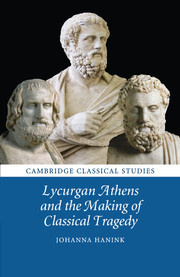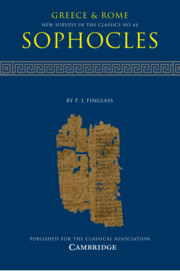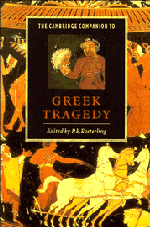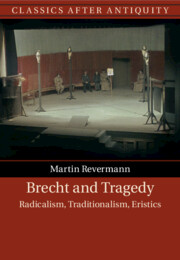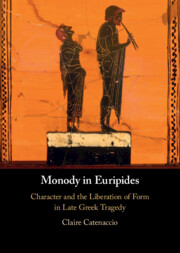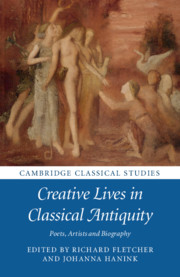Lycurgan Athens and the Making of Classical Tragedy
Part of Cambridge Classical Studies
- Author: Johanna Hanink, Brown University, Rhode Island
- Date Published: March 2017
- availability: Available
- format: Paperback
- isbn: 9781107697508
Paperback
Other available formats:
Hardback, eBook
Looking for an inspection copy?
This title is not currently available on inspection
-
Through a series of interdisciplinary studies this book argues that the Athenians themselves invented the notion of 'classical' tragedy just a few generations after the city's defeat in the Peloponnesian War. In the third quarter of the fourth century BC, and specifically during the 'Lycurgan Era' (338–322 BC), a number of measures were taken in Athens to affirm to the Greek world that the achievement of tragedy was owed to the unique character of the city. By means of rhetoric, architecture, inscriptions, statues, archives and even legislation, the 'classical' tragedians (Aeschylus, Sophocles and Euripides) and their plays came to be presented as both the products and vital embodiments of an idealised Athenian past. This study marks the first account of Athens' invention of its own theatrical heritage and sheds new light upon the interaction between the city's literary and political history.
Read more- Provides the first comprehensive account of the early Athenian reception of classical tragedy
- Adopts an interdisciplinary approach to Athenian literary history
- All Greek is translated
Reviews & endorsements
'Hanink writes in a lucid and engaging style, bringing together the disparate evidential strands, archaeological, epigraphical and literary, into a persuasive synthesis, and handling deftly the balance and interplay between the political and literary aspects of her topic … the book makes a very valuable, well-rounded, contribution to our understanding of the literary, political and monumental aspects of post-fifth-century tragedy in general and its role in the Lycurgan policy agenda in particular; and the lively, well-crafted and accessible style in which it is written will make it attractive to teachers and students as well as useful to researchers.' Stephen Lambert, Bryn Mawr Classical Review
Customer reviews
Not yet reviewed
Be the first to review
Review was not posted due to profanity
×Product details
- Date Published: March 2017
- format: Paperback
- isbn: 9781107697508
- length: 296 pages
- dimensions: 216 x 140 x 16 mm
- weight: 0.38kg
- contains: 8 b/w illus. 1 table
- availability: Available
Table of Contents
Introduction: through the Lycurgan looking glass
Part I. Classical Tragedy and the Lycurgan Programme:
1. Civic poetry in Lycurgus' Against Leocrates
2. Scripts and statues, or a law of Lycurgus' own
3. Site of change, site of memory: the 'Lycurgan' Theatre of Dionysus
Part II. Reading the Theatrical Heritage:
4. Courtroom drama: Aeschines and Demosthenes
5. Classical tragedy and its comic lovers
6. Aristotle and the theatre of Athens
Epilogue: classical tragedy in the age of Macedon.
Sorry, this resource is locked
Please register or sign in to request access. If you are having problems accessing these resources please email [email protected]
Register Sign in» Proceed
You are now leaving the Cambridge University Press website. Your eBook purchase and download will be completed by our partner www.ebooks.com. Please see the permission section of the www.ebooks.com catalogue page for details of the print & copy limits on our eBooks.
Continue ×Are you sure you want to delete your account?
This cannot be undone.
Thank you for your feedback which will help us improve our service.
If you requested a response, we will make sure to get back to you shortly.
×
